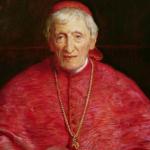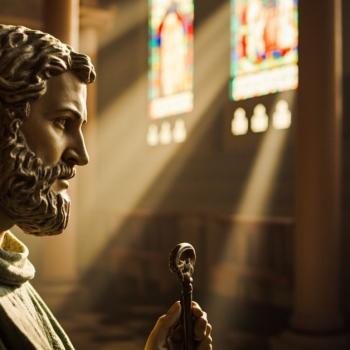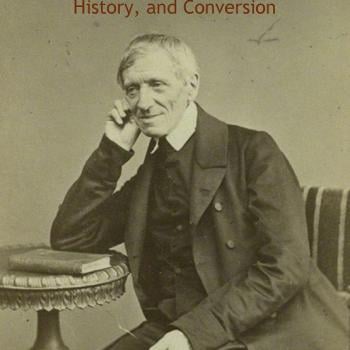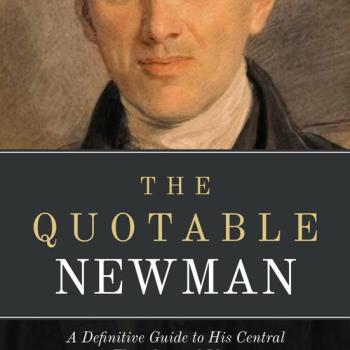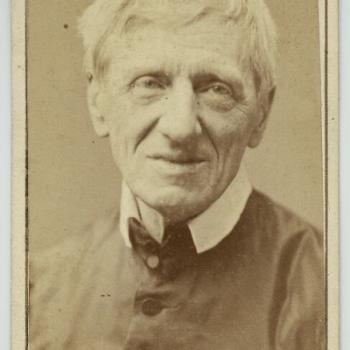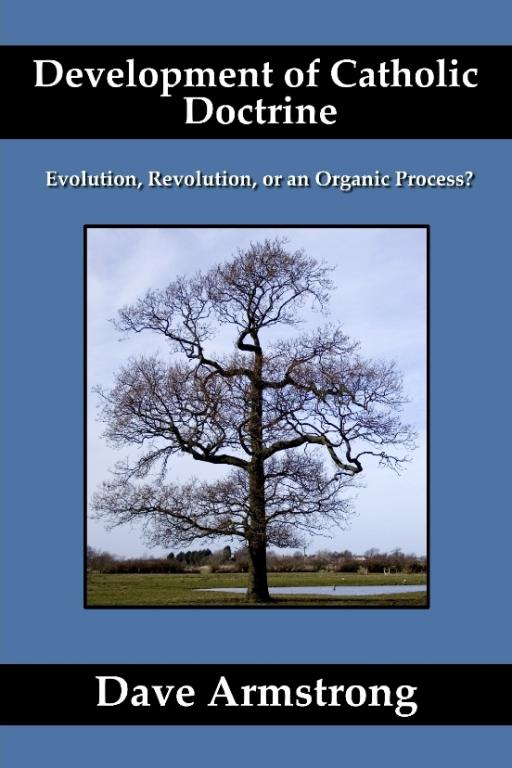
Development of Christian doctrine is a subject near and dear to my heart, as it was John Henry Cardinal Newman’s book An Essay on the Development of Christian Doctrine, which played the largest role in my decision to convert to Catholicism. The following is a transcript of a May 1, 1999 interview via telephone with Dick Kelley, host for a Connecticut Catholic apologetics television show called Pillar of Truth (my black-and-white mug shot appeared on the screen).
Development isn’t often talked or written about — even in apologetic circles –, for some reason, which is sad, I think, because I regard it as the key factor in understanding Catholic history, and why Catholicism appears so “extravagant” and “excessive” compared to the “lean and clean” version of “mere Christianity” which is Protestantism. The interview was approximately 25 minutes long. The audio file of the interview is also available as a free download (but it is of relatively poor quality). My book above is also available (as low as $2.99 for an ePub or mobi file)
Dick’s words will be in blue.
* * * * *
Q: Tonight we have a guest with us. His name is David Armstrong. Dave is a convert to the Catholic faith. He converted in the early 1990s, from evangelical Protestantism. Dave is also a free-lance writer. He’s a frequent contributor to Marcus Grodi’s Coming Home Network Newsletter; also some other publications: Hands-On Apologetics, This Rock . . .
His conversion story appears in a book called Surprised by Truth, which is edited and brought together by Patrick Madrid. The subtitle of it is: “Eleven Converts Give the Biblical and Historical Reasons for Becoming Catholic.” Dave, welcome to Pillar of Truth!
A: Great to be here, thanks.
Q: One of the ways that I got to “know” Dave is through his website, Biblical Evidence for Catholicism. I get an awful lot of information out of that. Start us off by telling us, what is doctrine? Let’s bring this down to a very simple level so we can all understand it. When we say the development of doctrine, what are we developing; what exactly is this doctrine, or any doctrine?
A: The Catholic Church would say there was one apostolic deposit, given from Christ to the Apostles, and there’s been no change in that, in terms of essence or substance; so the Catholic Church preserves that, and is the Guardian of it. But, on the other hand, there is a growth in depth of clarity, in the understanding of those truths, without essential change. In other words, the subjective grasp of men increases, without the actual doctrine or dogma changing in an essential way. That’s the main distinction to keep in mind when one is talking about development.
Q: Okay, so then doctrine would be something that was taught or was given to us by Jesus and the Apostles; is that correct?
A: Yes.
Q: The development of doctrine then is the maturing of this belief? Give us an example of the development of doctrine.
A: Okay. Protestants often talk about progressive revelation. When you read the Bible, if you start in Genesis, I think anyone would recognize immediately that that’s a lot different from reading, say, John or Colossians. There’s obviously a great development of the thought, and the theology. As an example, I would mention the idea of faith or salvation.
If you go back to Abraham, you have the Abrahamic Covenant, which basically is, Abraham believing in God, and as it says in the Bible, it is “reckoned unto him righteousness.” Moving on from there, you have the notion of the chosen people, which is somewhat like election, as we would say as Christians now, or enabling grace from God. In other words, it’s unmerited. God chose them and gave them grace for His purposes.
And you progress from there to the Davidic Covenant, which is an eternal covenant given by God to David. And you have, of course, Moses and the Law; the commandments. Then you move up from that to a notion of the Messiah. So that you see this development, where at first you didn’t have much notion of the Incarnation or Jesus. They just didn’t know that yet. Eventually you get to Isaiah 53, where you have the “suffering servant.”
To my knowledge, that’s the first indication of what actually happened on the cross (there might be something here or there — like Psalms 22). So, that’s a development all the way through the Old Testament, to the gospel being announced, with John the Baptist and Jesus Himself, and even then Jesus said, “I came not to change the Law but to fulfill it.” So in my mind that would be a very clear example of development in the Bible itself.
Q: So that Jesus, when He said that “I came to fulfill,” it’s like He’s bringing to a conclusion all the development that’s occurred so far in the Old Testament.
A: Yes.
Q: God revealing Himself to the Jewish people . . . What would be an example of the Catholic development of doctrine? Something that was taught by Jesus and the Apostles, and has matured through the 2000 years of Catholic thinking?
A: First, I would mention Christology, for the reason that, basically all Christians are agreed on that aspect of theology: the nature of Christ and the Trinity. But this was definitely a development, because it wasn’t explicit in the Bible. On my website, I have a lot of Scripture that would indicate the Trinity and Christology [Jesus as God], but if you didn’t put it together in that way, it wouldn’t jump right out at you from Scripture. So for that reason the Church had to develop it — and usually in response to heretics.
So you had, for example, the Nestorians, claiming that, basically, Jesus was two persons, where He was human and divine. They tried to make a distinction of persons. And the Church said “no, that’s not true. He’s one Person, the God-Man.”
And when the Church pondered the nature of Mary, it said Mary was the Theotokos, which means “God-bearer,” so she’s the “Mother of God” — that’s where that came from. That was at the Council of Ephesus in 431. So this is an example of the heretics coming along, making a claim. The Church then reflects upon it, and rules against it. The Church decrees — by its apostolic authority — that the Christian teaching is that Jesus is the God-Man, with no separation.
And that was further elaborated upon in 20 years, at the council of Chalcedon in 451, which promulgated the notion of the Two Natures of Christ and the Hypostatic Union, where Jesus is God and Man, and there’s no separation. That was in response to the Monophysite heresy, which held that Jesus had one nature. The Church ruled that He had Two Natures. And so, on and on, with all the heretics.
Q: If it wasn’t for what we call the development of doctrine, we’d have been in a mess!
A: Well, I think so.
Q: One of the issues that our anti-Catholic brothers and sisters like to emphasize is that the Catholic Church teaches so many things which are “not found in the Bible.” For instance, you won’t specifically see the Assumption of Mary in the pages of Scripture. That probably is — I imagine — a doctrine that is developed over the years. Where in Scripture does the Church receive its authority to do this? Is there any precedent from Jesus or one of the writers of the New Testament which says that this will occur, this development of doctrine? Where do we have permission to do this?
A: That’s difficult to establish, in terms of an explicit passage. But the way I would defend it, is by what I’ve already done: by showing that the Bible itself, in its own example, develops, so therefore the Church is merely continuing that process of developing thought. But there are a few passages, like the parable of the mustard seed (Mt 13:31-32), where the kingdom of God is like a mustard seed, and it grows into a huge tree — so obviously there’s a growth. And also the analogy of the Body of Christ. That implies that it is a living organism; therefore it grows (an increase of understanding). And you have the Holy Spirit, in John 14:26 and 16:13; Jesus says “He will lead you into all truth” — the Paraclete, the Comforter.
Part of that is teaching. The Church learns things through the ages. There is no reason to think that all knowledge will cease after the apostles. We still reflect upon doctrines. Even the Protestant “Reformation,” as they call it — I would call it a Revolution — pretty much presupposes that they think that they are a development. It’s a new teaching, in terms of Church history, according to them. They really accept this, too, on their own terms.
Q: You made a good point, when you used the analogy of the growing body. Protestantism, unfortunately, would more resemble a statue, than a living body, because it doesn’t grow.
A: That’s right.
Q: What was the “schema of Church history” which you had constructed? What was the picture of the Church that you had in mind up till now?
A: Basically, it’s what I call the “Protestant myth.” I don’t use that word to say it’s totally false, like Aesop’s fables or something, but it’s sort of a legend or picture that Protestants have of the early Church. The average Protestant thinks that the early Church basically was Protestant — with a few differences. They won’t say that it looks like the 16th century. But they would say that the early Christians were much more Protestant than they were Catholic. So I just accepted that.
When you’re a Protestant, you simply assume these things. You don’t pursue it, usually. So I had to come to grips with this sort of thing. I didn’t like the Catholic Church. It seemed to have this excessive growth, that appeared to the outsider as a corruption. But what I didn’t realize is that corruption can just as easily be subtraction from the received teachings of Christianity.
Either way, it’s a corruption. An automobile that didn’t have spark plugs, or gas, or brakes, would be a corrupt car. That’s how I view Protestantism. Cardinal Newman gave me (as I see it) the key to Church history; how to understand a consistent development, compared to a corruption.
Q: So Newman struggled with it, too, then?
A: Yes, in his case, being Anglican, what he was working through was called the Via Media, where they thought that Anglicanism was sort of a “middle way” between Catholic and Protestant. His studies of Church history led him to believe that it was thoroughly inconsistent; that this so-called “middle way” was not synonymous with orthodoxy. The Catholic Church had always been that, and was in his own time, by the same principle. The Protestants introduced a radical change of principle. They claimed to be going back to the early Church, but they’re really not, because many of their teachings were never there.
For instance, I have a quote here from Norman Geisler, who’s a well-known Protestant apologist. This is from his book Roman Catholics and Evangelicals, which came out in 1995 — page 502. He states: “Between the time of the Apostle Paul and the Reformation, scarcely anyone taught imputed righteousness, or forensic justification.”
Now that’s a remarkable statement, in that it pretty much undermines the entire notion of the so-called “Reformation,” which was supposed to be going back to early Church doctrine and bringing it back again (which is what the very word reform means). But he flat-out admits that it’s never been there since the Apostle Paul [and Catholics would vigorously dispute that as well!]. Therefore, that particular doctrine is a corruption, not a development.
Q: We Christians sometimes don’t want to change, even when we’re shown to be wrong. Something that Newman wrote convinced you, and you were obedient enough that you did change your way of thinking, and were willing to admit that you were wrong. What was the force of Newman’s argument? What was it that he was able to say to bring you to that point?
A: He makes a series of analogies, showing that the Catholic Church was orthodox, and the early heretics were not. For example, he explained that the heretics were known for Scripture Alone, which is one of the Protestant pillars. They would appeal to Scripture, but Newman said the Church would appeal to not just Scripture, but also to the Fathers and Apostolic Succession, or Tradition. The patristic idea was that whatever is true Christian doctrine, can be shown to have been passed down historically.
So the Fathers would cite an early Church Father like St. Clement or St. Ignatius. This was a different principle of authority. Sola Scriptura can’t be found in the Fathers. But the way Newman really hit home with me was — I mentioned in my story — , was as follows: I used to picture Christianity or the Church as a ship. So Tradition would be like the barnacles underneath the ship.
Q: All the extras . . .
A: You have to get rid of it; you have to scrape it out. But Tradition, rather than being the barnacles on the ship, is the rudder of the ship, or the guiding principle of the Church, as it passes through the “sea of history,” so to speak. So development is the principle of a living, breathing Tradition, guided by the Holy Spirit, and also the consciousness of the Church as a whole.
And Newman writes about the laity — that’s a theme of his, what’s called the sensus fidelium in Latin: the “sense of the faithful.” It’s difficult to briefly summarize but his arguments made it very clear to me that the Catholic Church always was the Church, and the papacy was at the center of orthodoxy with a small “o”.
Q: We could probably say that the Bible is actually an example of development of doctrine.
A: Oh, for sure.
Q: How did we get our Bible, Dave?
A: A lot of Protestant views of Scripture or variants of sola Scriptura are more or less like Islam, where Muhammad receives the Koran out of heaven. In other words, it’s written by God, without the involvement of human beings and Tradition. But, of course, anyone who knows Church history at all knows that’s not true, that the canon of Scripture is a development, that lasted some 350 years, and the Bible we have today was finalized only in 397 at the Council of Carthage. James and Revelation, for example, were accepted very late. Right up to the late 4th century they were being disputed.
And other Fathers accepted books that later weren’t in the canon, like the epistles of Barnabas and Clement. So it’s definitely a human process; it’s a Church authority issue, and this is where Protestants have a huge problem, of what might be called epistemology, because they appeal to Scripture Alone, yet Scripture itself talks about Tradition (which is another issue). But also that the canon of Scripture isn’t in the Bible. That’s obvious, too, but they just accept it. I don’t think they really analyze it closely enough.
Q: Of all the doctrines which had developed over the years, was there any one in particular that you really had to struggle with?
A: Yeah; I would say that that’s infallibility. For several months I tried to refute that, because I thought it was ridiculous, on the face of it — someone claiming to be infallible . . . As a corollary to that, I would say, the Inquisition was what bothered me the most. To me that was a disproof of the divine origin of the Catholic Church. But then later I studied the “Reformation” and I saw that they committed far worse atrocities than the Catholics did, while claiming to be the “reformers” and more “pure,” etc.
So I concluded that that issue was a wash; that no one can claim any sort of moral superiority. Everyone’s a sinner; the Church has never claimed to be sinless. I studied infallibility for almost a year, and Newman — again — was the one who helped me resolve that, because he showed that these things were consistent developments, rather than corruptions, even though they appeared to be much larger — as if they were corruptions of doctrine.
Q: Thank you very much for joining us this evening, and I’ll be in touch again.
A: Alright.
Q: Thank you, Dave.
A: God bless.
***
(originally 5-1-99)
Photo credit:
***


